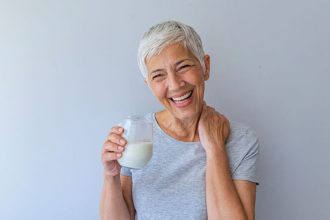Vitamin D and healthy bones
The body creates the majority of vitamin D via sunlight exposure, but with more and more of us working a 8am-6pm working day – we don’t get to see much sunlight.
Osteoporosis is a progressive skeletal condition that can be painful and disabling for the sufferer. As our age increases bones become thinner leaving them more fragile and therefore more prone to fracture.
So, it’s vitally important to think about the condition of our bones in early life and to adopt a diet that maintains and supports bone growth and health throughout our entire lives.
In recent years there has been an increase in the number of those affected with osteoporosis. It can affect both men and women, however women are at greater risk, particularly after menopause when levels of the protective hormone oestrogen begin to drop. Osteoporosis, also known as brittle bone disease and now affects over 3 million people in the UK. Sadly, it’s an irreversible condition; when bone mass has been lost it sadly cannot be replaced. Fractures most commonly occur in the hip, wrist and spine.
There are various contributing factors towards osteoporosis and we’re seeing an increase in the number of people who are affected by this condition. Eating disorders increase the risk of osteoporosis and have been on the increase over recent years. Extremely low calorie diets can result in vital vitamin and mineral deficiencies. Maintaining adequate body weight is important for bone health and it is important for young women to reach their peak bone mass in order maintain healthy bones throughout adulthood.
Those with higher bone mass at a younger age are more likely to have higher bone mass later on in life.
Vitamin D plays an important role in maintaining bone health. Without Vitamin D, our bodies cannot effectively absorb calcium, which we all know we need to maintain strong bones. The body creates the majority of vitamin D via sunlight exposure, but with more and more of us working a 8-6pm working day – we don’t get to see that much sunlight and are more likely to be deficient in D vitamins, especially Vitamin D3. Vitamin D can be found in meat, eggs and oily fish such as salmon sardines and mackerel.
Vitamin D3 is made by our bodies when we absorb sunlight.
Osteoporosis is a prevalent disease, however there are risk preventive measures and medical treatments for pain and for the prevention of fractures. For instance, both smoking and alcohol consumption affect bone density. Quitting smoking can reduce the risk of developing this disease and ensuring only moderate alcohol consumption can also help to prevent osteoporosis.
Caffeine, salt and soda drinks have a negative effect on bone health, so it is important to limit these in the diet. Regular exercise is also vitally important for the prevention of bone degeneration.
A healthy diet containing adequate calcium and vitamin D is important in maintaining bone health. Calcium and vitamin D supplementation is an optional treatment if extra vitamin D is needed. Supplementation should be carefully measured and doctors advice sought after. Vitamin D3 supplements may be helpful too if you are not getting enough daylight exposure. Vitamin D3 plays a wide role in our overall health.
If you’re affected by Osteoporosis and would like more information visit: www.nos.org.uk The National Osteoporosis Society are committed to helping people with osteoporosis.
Tracey Morgan – BSc (hons) Public Health & Nutrition – PGdip Food Science & Technology.










